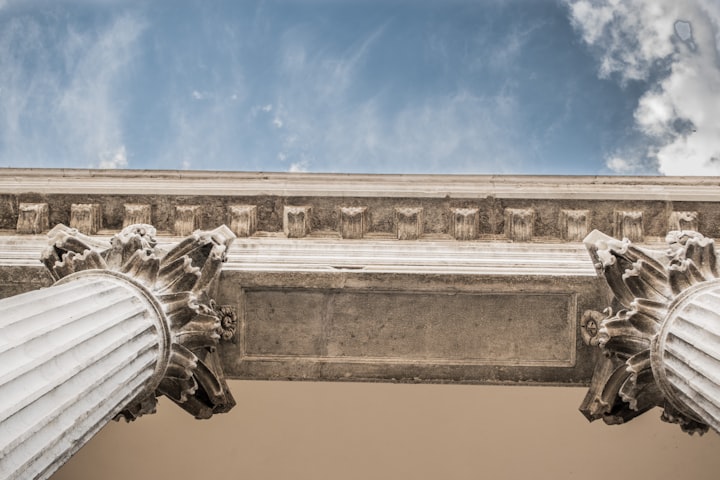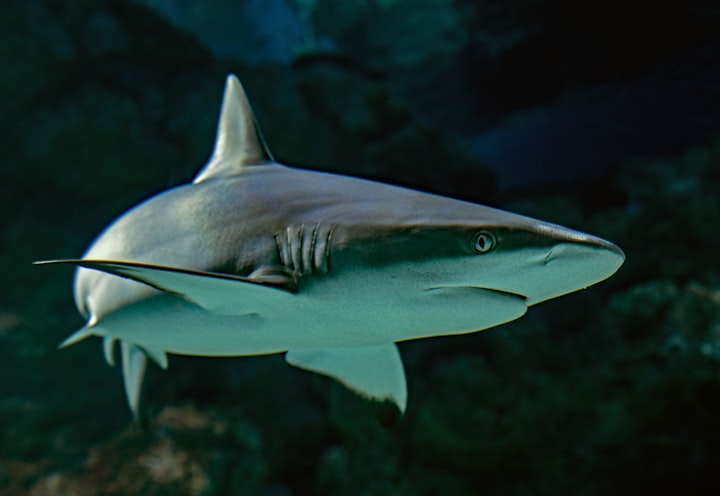The Minotaur
Reimagining the Myth
My birth was not an easy one. I nearly tore my mother in half, or so the rumors go. I suppose it was the only natural conclusion to a pregnancy which itself was an abomination of the worst sort.
My mother, the Oceanid Pasiphae, was a child of the Titan Helios, and so she was raised in his gilded palace beneath the sea until she was betrothed to my father and sent to live above the surface. For all her nymph-like beauty and poise, that slow maritime grace that roared in her veins like the ocean itself, Pasiphae had been seduced by a white bull. The unnaturalness of it mortified her, once she came to her senses. But by then the mark of her shame had already begun to grow inside of her.
Of course, there was more to it than that. Poseidon, that Olympian whose dominion is the ocean, had sent my father the bull for sacrifice-- a brute with a coat as white as fresh milk and eyes the same murky green as the waves that surrounded our little island. Its horns were of gold, and the heavy line of its shoulders was immense with muscles that strained and trembled under the thin layer of unblemished hide-- a beautiful specimen. The Great King Minos, my father, was meant to slaughter the thing to honor the sea god. But ever grasping, he determined to keep the creature for himself.
The remedy for pride, Poseidon reasoned, was humiliation and so he devised a plan to make a fool of my father. He enchanted my mother with a kind of madness, a dark passion for the bull that came over her with all the intensity and abruptness of a fever.
After many weeks of beseeching Daedalus, that shrewd inventor with a brain so keen it could cut any man it chose, she was rewarded for her efforts. He fashioned her a wooden sow-- hollow so that she could hide herself within it, and trick the sacred bull into thinking it his carnal counterpart.
When I arrived, ripped from my mother’s stomach, I had the body of a normal human child and the head of a bull. Gazing down upon the tufts of soft fur that ran all the way down my neck, and the flushed skin of my chubby infant's body, she must have seen something to love in me-- something that was not monstrous but beautiful and fated. Why else in those early morning hours had she christened me Asterion, meaning starry one?
* * *
My human sisters would whisper stories to each other before bed. Stories of the divinity of gods, and the mortal heroes they sired. No monster was a match for these demigods-- not the sirens with their enticing eyes and even more alluring melodies, nor the slickly scaled hydra with its infinite heads. My sisters would utter the names of each creature, and then just as quickly, make frantic clawed motions with their hands, from the chest outwards, our sign for expelling evil.
They gave little thought to me, the thing in the corner. After all, I was their brother, no matter how oddly made I was. It did not occur to them then that I was one of the uncanny creatures they spoke about.
The word that my father’s men used was Minotaur. A heavy combination of my father’s name, Μίνως, and ταύρος, the term for bull. They said it in a hush, with uneasy, darting eyes that seemed to scour every nook and corner for signs of the monster they spoke of. The Bull of Minos. To them, I was not Asterion. Although I was not born of him, I could not escape being my father’s son.
The palace at Knossos was opulent, even amongst others of its kind. The walls were thickly constructed from marble and clay, and painted over with red ochre that drew the eye first this way and then that. Frescoes, painted on the smoothest plaster lined the corridors, rendered in ornate colors. I would spend hours studying the ruddy blush of a painted nymph’s cheek, or the sleek blue glimmer of a dolphin’s back. Byzantine painted borders flanked the doorways, a reminder that every transition was holy. Sturdy Minoan columns, carved from the trunks of wild cypress, sprung up from the flagstones, and pottery amphora’s and pithoi adorned the alcoves. No expense was spared. It was a stronghold befitting a son of Zeus. And if there was one thing my father adored, it was his own claim to divinity.
I was kept ensconced in towers and courtyards so that no person might encounter me. Sometimes, Icarus, that sweet son of Daedalus, would invite me into his father’s workshop and we would pour over the multitude of impossible inventions together, eyes wide with wonder.
Although Minos imposed strict rules about the flow of information out of the palace, gossip made its way into the world. I grew a layer of coarse white fur all over my chest, leading up to the glossy curls of white hair that crowned my bull’s head. I had been muscular even as a child, with long delicate feet, and in my adolescence, I was slender around the waist, but wiry and strong. I might have been considered comely, I suppose, if not for my beastly upper half.
My visits to the workshop with Icarus were quite suddenly halted. Rumors circulated that the old inventor was working on a very special project for my father the king, and that no one must know anything about it. And so we spent our days with my eldest sister, Ariadne, dancing and laughing in the palace courtyard. Our time was short, but we had no way of knowing that.
* * *
One morning, I was dragged from my bed by a multitude of my father’s strongest soldiers. The tips of their spears cut into my back, but I went gently, as I always had. For all the bizarreness of my appearance, my temperament had always been one of careful, wary observance.
They led me down below the floors of the palace, and from there, into a narrow passageway. Daedalus stood in the doorway, his head bowed.
“I have to seal you in,” he explained, gesturing to the heaps of wet clay that stood ready beside the narrow point of entry. I stared down the corridor, which was only blackness, my heart thundering.
My eyes shifted frantically from the soldiers to the old inventor who had once been my friend. This passageway must have been what he had been working on for the past few years.
“Your father--” he began, before breaking off and shuddering.
“He is ashamed,” I finished flatly. Daedalus nodded.
“Do Ariadne and Icarus know?” I choked.
Daedalus shook his head, rubbing the back of his neck. Beside him, the guards were moving from foot to foot in anticipation, smiling caustically in the candlelight.
He moved in closely to whisper in my ear, so softly that the men could not hear, “It will be dark in the labyrinth, and it is designed so that you will never be able to find your way out. For you, there will be no possible escape. You will need to be your own light—your own starry one. But I have devised an invention so that your sister can visit you. She will come and see you when it is safe.” He pulled away brusquely, his face becoming impassive.
Numbly, I backed into the tunnel watching dully as the light was gradually obscured my pound of clay and rock.
* * *
I could tell you everything about the labyrinth except for what it looked like. Alone in the dark, I felt my way along the walls, which were smooth and damp with groundwater. The smell of the place was ancient and dank. I imagined in those early days, that I was perhaps near the black-lit halls of Hades, just feet from the underworld in any direction. It was not a particularly warming thought but it circulated in my head, untethered.
I waited for Ariadne, attempting to ignore the gnawing in my stomach. I had not eaten for what felt like weeks.
And then, like magic, one evening she appeared, clutching of all things, a great red ball of yarn. The light from her solitary candle seared my eyelids, and I had to shut my eyes against her.
“Oh, sweet boy. My Asterion,” she wept, cradling my head as I shivered under her touch, “How cruelly they have kept you.”
She had thought to bring along thick slabs of mutton from the kitchens, and I devoured them frantically, afraid for a moment that I might be sick.
She asked me about the underground, but I found I could not tell her anything. The hours had bled together, tangling my mind in a kind of frenzy that was immune to logic or calm.
“I feel insane,” I mumbled to her softly.
“We need to get you out,” she returned, her warm brown eyes clouded with worry.
* * *
When I did not die of starvation beneath the palace floors, my father settled on a new course of action. He spread rumors that I was a ferocious beast, one that subsisted off of human flesh. He began demanding tribute from the Athenians for the murder of my older brother, a boy much older than I, who I had never particularly known.
Athens was to send their most spectacular youths for me to devour in the winding corridors of the labyrinth. In actuality, Ariadne explained to me in the evenings when she visited with food, my father simply had them executed and left out for the crows. I shuddered at the idea of them lying out in the fields, deprived of a proper burial.
And so when Ariadne disappeared back to the world above ground, my mind was haunted by images of them. Or of thoughts of my mother as a girl beneath the sea-- if the waves had been like the ground above me now, keeping her contained. I thought about Ariadne. And above all, I considered darkness. How it wound its way inside of you and turned you into nothing, a churning void of annihilation that could not possibly exist.
* * *
“I want you to kill me,” I explained to my sister during one of her visits, as we sat together, huddled against a wall, the red yarn clutched in one of her pale hands.
She shook her head.
“Please,” I begged, as the humming in my head reached a fever pitch, “Please, I can’t take it down here; there are not even shadows for company.”
“I don’t have it in me,” she retorted simply, her eyes wide with tears.
“Then find someone else who does, and bring them to me. They will be regarded as a hero for slaughtering the Minotaur.”
Ariadne said nothing, staring into the soft light of the single candle between us. She shook her head again, but this time her movements lacked conviction.
* * *
Some weeks later, I heard footsteps too heavy to be my sisters. My mouth went dry, but I stayed where I was.
“Who goes there?” I asked.
“Theseus,” a voice murmured from the shadows, and I caught a glimpse of a tall, lanky youth with my sister’s yarn in one hand and a blade in the other. He was handsome in a strange way, with blue eyes and thick rosebud lips. I took a deep breath.
“When you are done with me, you have to take her with you,” I expelled into the air between us, “Get her away from here, away from Minos.”
Theseus nodded gravely, his eyes roving over my unusual body, filled with something like pity.
“You have my word,” he returned.
He blew out his candle and the world went dark once more.
About the Creator
Katie Alafdal
queer poet and visual artist. @leromanovs on insta







Comments
There are no comments for this story
Be the first to respond and start the conversation.